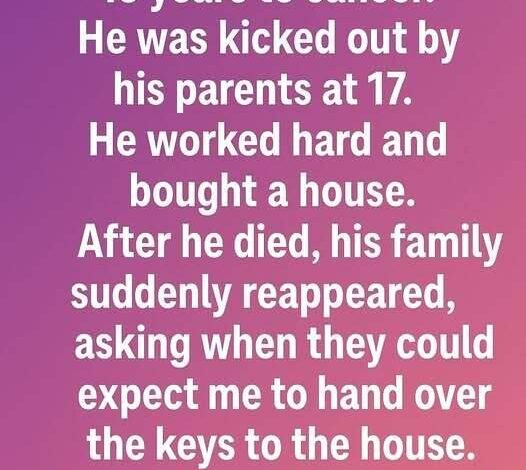“They Asked for the House My Boyfriend Built — I Had One Sincere Condition”

When I lost the man I’d spent fifteen years with, it felt like the world stopped turning. He wasn’t just my partner — he was the person who steadied me, understood me, and made anywhere feel like home. His childhood had been rough. At seventeen, his own parents pushed him out, forcing him to build a life without support. He worked nonstop, saved whatever he could, and eventually purchased a small, worn-down house on the edge of town.
That house became our shared project. We painted the walls a soft ocean blue, even though the nearest beach was hours away. We disagreed on decorations, laughed late into the night, and slowly filled the rooms with pieces of ourselves. It was never just a building — it was proof of his strength, his quiet optimism, and the love we created together.
He used to say, “This will be our forever place.” I’d joke that forever was too big for one address. But when he passed unexpectedly, that little house became the last piece of him I had. I promised myself I’d keep everything as it was. The house became more than a home — it became a heartbeat.
And then his family appeared.
They hadn’t been part of his life for years. No phone calls, no visits. I’d watched him try — birthdays, holidays, attempts to reconnect — but they always turned away. Now, after the funeral, they stood at my door asking when I planned to hand over the keys.
I was speechless. They had walked away from him long ago. This place wasn’t just his — it was ours. But grief makes it hard to say what needs to be said. I simply told them I needed time.
That night I sat in his favorite spot — the living room — staring at our photo above the fireplace. I traced the frame, wondering what he would tell me to do. He always believed in choosing kindness, even when it hurt.
So the next day, I invited them back. They came expecting a fight. Instead, I offered tea and asked them to sit. When the room grew still, I looked at his mother and said, “You can have the house — but only if you accept one condition.”
They went silent.
“You can have it,” I repeated, “if you promise to keep the same love and gentleness he poured into this place. That’s all I ask. This home is his heart. If you can honor that… it’s yours.”
His mother’s eyes filled with tears. She looked older, weighed down by years of regret. “I made mistakes,” she whispered. “So many. And I didn’t know how to fix them while he was here.”
For the first time, I didn’t see the woman who had shut him out. I saw someone carrying the consequences of her choices. Something inside me softened.
We talked for hours. I told her about the way he hummed while working, how he couldn’t walk past a stray animal without trying to help, how he built our porch swing just for me. She shared stories of the child he had been, long before life hardened him.
By the time the sun lowered, the house felt different — less heavy, more whole.
When she left, she hugged me. “Thank you for loving him,” she said.
I almost replied, “Thank you for finally remembering him.” Instead, I just nodded.
In the weeks that followed, they returned often. His mother helped care for the garden he planted. His sister brought old photos — snapshots of him as a smiling kid with his father’s arm around him. Slowly, the resentment I’d carried began to loosen.
I never legally transferred the house. They never brought it up again. It wasn’t about ownership anymore. It became a shared place of remembrance — a bridge between the life he built and the family he’d left behind.
The house grew warmer. Laughter returned. Sunday dinners around the table he built filled the rooms with a familiar kind of joy. Sometimes, if I listened closely, it felt like I could still hear him laughing.
One evening, I sat on the porch swing he made. His mother joined me. We watched the stars until she murmured, “He would’ve been proud of you.”
Tears stung my eyes. For the first time since he passed, I didn’t feel like I was clinging to the house to hold onto him. I realized I was honoring him by letting it become what he always wanted: a place filled with love.
Grief taught me to guard memories as if they might shatter. But love, I’ve learned, survives best when you let it breathe.
Now, when I walk through the rooms we shaped together, I don’t feel alone. I feel him — in the smell of polished wood, in the laughter drifting from the kitchen, in the flowers his mother plants each spring.
He built the house with his hands. Together — through healing and forgiveness — we built something far stronger.